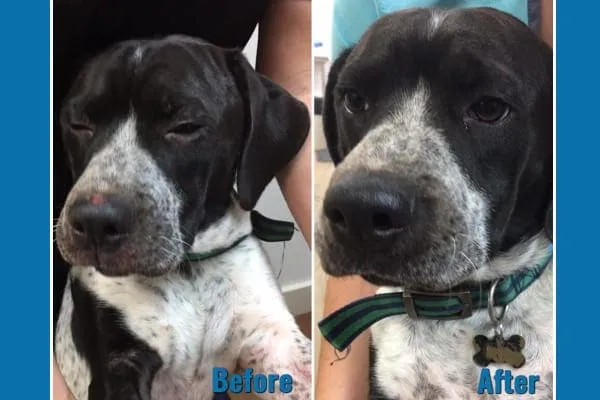If you’re searching for comprehensive guidance on the Best Allergy Medicine For Dogs With Itchy Skin, you’ve come to the right place. As an integrative veterinarian, Dr. Julie Buzby offers expert insights into the signs, symptoms, and various treatment options available for canine allergies, including the latest advancements in medications like Apoquel® and Cytopoint®.
 Senior dog rubbing face with paws, a classic sign of allergies, while lying in green grass and dandelions
Senior dog rubbing face with paws, a classic sign of allergies, while lying in green grass and dandelions
Allergies are a remarkably common challenge for many dogs and their devoted human companions. The constant scratching, licking, and discomfort can significantly diminish a dog’s quality of life. Fortunately, the landscape of veterinary medicine has evolved dramatically. Beyond traditional “go-to” options like Benadryl® and prednisone, we now have a wider array of effective veterinary-prescribed medications, such as Apoquel and Cytopoint, designed to quickly alleviate the relentless itch.
This article will provide you with a comprehensive list of 10 effective solutions for dogs suffering from allergies and itchy skin, covering everything from traditional approaches to cutting-edge treatments.
Understanding Canine Allergies: What Are Dogs Allergic To?
Before delving into treatment strategies for managing allergies in dogs, it’s essential to understand the different types of allergies our canine companions can suffer from. Dog allergies typically fall into three primary categories:
- Environmental allergies
- Food allergies
- Flea allergies
It’s worth noting that dogs can be allergic to many of the same substances that trigger allergies in humans.
1. Environmental Allergies in Dogs
Environmental allergies, often referred to as seasonal allergies, atopy, or atopic dermatitis, are precisely what their name implies—allergic reactions to elements within your dog’s environment. The most prevalent environmental allergens include:
- Tree pollen
- Weed pollen
- Grass pollen
- Dust mites
- Mold and mildew
While these are the most common, dogs can develop allergies to numerous other environmental substances. A dog might exhibit allergy symptoms only during specific times of the year when certain pollen counts are elevated. Alternatively, if a dog is allergic to multiple pollens or to indoor allergens, they may experience symptoms year-round, making finding the best allergy medicine for dogs with itchy skin a constant quest.
2. Food Allergies in Dogs
Food allergies, medically termed cutaneous adverse food reactions (CAFR), occur when a dog’s immune system identifies specific foods or ingredients as allergens. A variety of foods have been implicated in canine food allergies, with beef, chicken, lamb, and wheat being among the most common culprits.
Dogs typically develop allergies to foods they have consumed for an extended period, often months to years. It’s less common for allergy signs to emerge immediately after introducing a new food.
3. Flea Allergies in Dogs
Dogs afflicted with flea allergies, or flea allergy dermatitis (FAD), are not merely reacting to the presence of fleas themselves. Instead, their allergic response is triggered by the flea’s saliva, which is injected into the dog’s skin during a bite. This means that even a single flea bite can cause a profoundly itchy and uncomfortable reaction in a flea-allergic dog.
The Cumulative Effect: When Allergies Require Combination Treatments
To further complicate matters, a dog might suffer from one, two, or even all three of these allergy types simultaneously. The symptoms from these different allergies have a cumulative effect, meaning they can intensify each other. This is precisely why your veterinarian may recommend a multi-pronged approach, combining various allergy medications for dogs, dietary adjustments, and other supportive strategies, especially if your dog is battling multiple types of allergies. Regrettably, there is no single “magic bullet” that provides a universal cure for all cases.
 A Golden Retriever dog rubbing his face in the grass, which can be a clear indicator that the dog may need allergy treatment
A Golden Retriever dog rubbing his face in the grass, which can be a clear indicator that the dog may need allergy treatment
Common Symptoms of Skin Allergies in Dogs
Dogs experiencing food, flea, or environmental allergies (or a combination thereof) typically present with similar clinical signs. Recognizing these symptoms is the first step in seeking the best allergy medicine for dogs with itchy skin. Some of the most common indicators of allergies in dogs include:
- Itchy ears that are prone to recurrent infections.
- Excessive licking or gnawing at their feet and legs, often due to itchy dog paws.
- Incessant scratching of the armpits, belly, face, base of the tail, or seemingly everywhere else on their body.
- Red, inflamed, and irritated skin that becomes susceptible to secondary yeast or bacterial infections, such as pyoderma in dogs.
- Frequently attempting to rub their face or body against furniture or the floor to alleviate itching.
- Dog losing hair due to persistent scratching and licking.
- Additional skin problems like hot spots in dogs, interdigital cysts in dogs, or furunculosis in dogs.
- Less commonly, a dry cough or other respiratory symptoms.
- Vomiting or diarrhea (occasionally observed in cases of food allergies).
The Impact of Allergies on Your Dog’s Quality of Life
Dogs suffering from moderate to severe allergies often endure constant scratching, obsessive paw licking, and a relentless cycle of ear and skin infections. This chronic discomfort significantly impairs their quality of life, preventing them from fully enjoying the simple pleasures of being a dog.
If your dog is exhibiting any of these symptoms, it is crucial to schedule an appointment with your veterinarian promptly to explore the best allergy medicine for dogs with itchy skin.
Diagnosing Allergies in Dogs: What to Expect at the Vet
During your veterinary appointment, your vet will conduct a thorough history taking, asking numerous questions about your dog’s lifestyle and health. This will include inquiries about your dog’s diet, the type and last dose of flea prevention used, the specific symptoms you’ve observed, whether these symptoms have occurred previously, and if the itching appears worse during particular times of the year.
A detailed physical examination, with particular attention paid to your dog’s skin, will be performed. This is vital because secondary skin and ear infections are common complications of allergies and can significantly exacerbate itching and discomfort. Your vet will also check if the dog has fleas and assess which areas of the dog’s skin are most affected.
It’s important to understand that there isn’t a single, definitive test that immediately diagnoses allergies in dogs. Instead, your vet will make a diagnosis based on the comprehensive history, observed clinical signs, and your dog’s response to targeted treatments.
While allergy testing for dogs does exist, its primary purpose is to identify specific environmental allergens for the development of allergy shots (immunotherapy), which will be discussed later. Allergy testing is only accurate for environmental allergies and not for food allergies. Diagnosing food allergies typically requires a carefully executed food trial, which will also be detailed further on.
To illustrate the diagnostic and treatment process, let’s look at a patient’s experience.
A Case Study: Treating Allergy Flare-Ups in a Senior Dog
Recently, I had the privilege of meeting Zachory, a 65-pound Chow mix who struggled with allergies. Adding to his challenges, Zachory was a fragile senior, experiencing back pain, hind-end weakness, and IVDD in dogs in his neck.
His dedicated mom wisely recognized that constantly contorting his body to scratch himself was detrimental to his orthopedic health. She understood his urgent need for relief from his environmental allergy symptoms, which were particularly severe each spring.
 Senior dog rubbing face with paws, a classic sign of allergies, while lying in green grass and dandelions
Senior dog rubbing face with paws, a classic sign of allergies, while lying in green grass and dandelions
For many years, when Zachory’s allergies flared, his mom would take him to the vet for a steroid injection. While steroids can provide miraculous relief, they come with a significant physiological cost over time.
However, Zachory had recently developed high liver enzymes in dogs and was also on a non-steroidal anti-inflammatory drug (NSAID). This combination meant that steroids were no longer a safe option for him. NSAIDs and steroids should never be administered concurrently due to the high risk of causing stomach ulcers in dogs and potential kidney damage.
Though Zachory initially came to me for acupuncture to address his neck pain, I was eager to discuss newer, safer, and more effective options for his allergies. Collaborating with his regular veterinarian, we decided to administer Cytopoint. Zachory’s injection, dosed according to his body weight, was an investment, but it was expected to keep him symptom-free for approximately a month.
Thankfully, Cytopoint posed no interference with his other medications and has proven to be incredibly effective for him! His mom described it as a tremendous relief for both of them, highlighting the importance of finding the best allergy medicine for dogs with itchy skin.
 A dog scratching obsessively with its hind legs, showing clear signs of needing effective allergy medicine for dogs
A dog scratching obsessively with its hind legs, showing clear signs of needing effective allergy medicine for dogs
The Science Behind the Itch: What Causes Allergies in Dogs?
To effectively treat skin allergies in dogs, it helps to understand the underlying mechanisms that cause them.
In humans, the immune system cells primarily responsible for mediating allergic reactions—known as mast cells—are predominantly located in the upper respiratory tract. This explains why many of our seasonal allergy symptoms manifest as sneezing, congestion, and watery eyes. However, for our canine companions, the distribution is different.
In dogs, mast cells are found in high concentrations within the skin, including the ears, which are essentially an extension of the skin. Furthermore, environmental allergens typically gain entry into a dog’s body through a compromised or defective skin barrier. This physiological difference is why dogs are far more prone to experiencing seasonal allergy symptoms that primarily affect their skin and ears.
 A Golden Retriever dog rubbing his face in the grass, which can be a clear indicator that the dog may need allergy treatment
A Golden Retriever dog rubbing his face in the grass, which can be a clear indicator that the dog may need allergy treatment
Under a microscope, mast cells have a distinct appearance, filled with tiny granules containing various active substances. The most well-known of these is histamine. Remembering histamine’s role is key, as it plays a central part in many allergy therapies, particularly antihistamines.
When mast cells encounter what they perceive as a potential threat—in this context, an allergen like pollen—they become activated and begin a process called “degranulation.” This is when they release the contents of their granules (histamine and other immune system molecules) into the surrounding tissue. This release initiates a cascade of events, recruiting other immune system cells and ultimately leading to the visible and uncomfortable symptoms of allergies.
Now that we understand the crucial role mast cells play in canine allergies, let’s explore the various allergy medicines for dogs and supportive therapies available.
Benadryl, Apoquel, and 8 More Options for Treating Allergies in Dogs
When it comes to finding the best allergy medicine for dogs with itchy skin, there are numerous options available, ranging from over-the-counter remedies to advanced veterinary prescriptions.
1. Antihistamines: Benadryl and Zyrtec
Antihistamines, such as diphenhydramine (Benadryl® for dogs), cetirizine (Zyrtec®), and hydroxyzine, are commonly used by humans for allergy symptom relief. These antihistamines can often be safely administered to most dogs. They work by preventing histamine from binding to cellular receptors and thereby blocking its effects.
Given that mast cells release histamine early in an allergic flare-up, initiating antihistamine administration at least two weeks before your dog’s typical seasonal allergy onset (based on previous history) can be beneficial. This proactive approach aims to dampen the allergic response before it fully escalates.
However, once an allergy flare-up is in full swing and histamine has already bound to receptors, antihistamines tend to be less effective at managing existing symptoms.
It is critically important to never give your dog an antihistamine product that is combined with a decongestant or any other medication (e.g., Claritin-D®). Certain decongestants, such as pseudoephedrine, can be highly dangerous for dogs.
The primary advantages of antihistamines are their accessibility as inexpensive over-the-counter medications and their potential to prevent or reduce mild environmental allergies in dogs. The main drawback is their limited efficacy for more significant environmental allergies, especially once symptoms are already present. Consequently, antihistamines are typically used in conjunction with other medications to achieve adequate symptom control.
BOTTOM LINE: Antihistamines are generally very safe as an allergy medicine for dogs but often lack sufficient effectiveness for anything beyond very mild allergy symptoms. Prescription allergy medications usually offer a much better alternative for more pronounced conditions.
2. Apoquel (Oclacitinib)
A significant advancement in the allergy treatment toolbox, Apoquel, received FDA approval in 2013. Oclacitinib (Apoquel®) works by specifically blocking the action of JAK1 and JAK3, molecules that are normally involved in transmitting the “itch and inflammation signal” that arises in response to an allergen. This targeted action leads to a rapid reduction in itching and inflammation for your allergic dog.
Like the dog shown in the before-and-after photos below, most allergic patients exhibit a swift response to Apoquel. It proves highly effective in both quickly quelling acute itching and managing allergies long-term, making it a strong contender for the best allergy medicine for dogs with itchy skin.
 Dog suffering from long-term chronic allergies before treatment
Dog suffering from long-term chronic allergies before treatment
This dog suffered from long-term chronic allergies. He was treated with Apoquel for allergies and antibiotics for a secondary bacterial infection of the skin. Photo credit: Dr. Julie Carroll.
The dog’s skin is less red and inflamed after being treated with Apoquel and antibiotics. Photo credit: Dr. Julie Carroll.
Typically, Apoquel is administered as pills or chewable tablets twice daily for the initial two weeks, followed by a taper to once daily for maintenance therapy. Some dogs may experience a resurgence of symptoms when transitioning from twice-daily to once-daily dosing. If you observe your dog becoming itchier again, consult your veterinarian for guidance on the appropriate next steps.
Possible Side Effects of Apoquel
While any medication carries a risk of side effects, the incidence of adverse reactions with Apoquel (such as vomiting and diarrhea) has been observed to be very low compared to many other medications.
Because Apoquel does modulate a chemical signal within the immune system, there is a theoretical risk of immune suppression, especially at high doses. However, Apoquel’s more specific target within the immune system, compared to broader immunosuppressants like cyclosporine or steroids, generally means a comparatively lower risk of widespread immune suppression.
Apoquel and Cancer in Dogs
In the interest of complete transparency, initial concerns were raised that Apoquel, due to its immune-modulating mechanism, might be linked to an increased risk of cancer development in dogs.
A recent study investigated this by comparing the occurrence of cancer and skin masses in allergic dogs treated with Apoquel against allergic dogs of similar age and breed who had never received the medication. This study found no significant difference in the rates of cancer and skin masses or in the average age at death between the two groups, providing reassuring data.
Nevertheless, the Apoquel product insert continues to advise caution, stating that it may exacerbate (worsen) cancerous conditions, and that the risks and benefits should be carefully weighed before using it in dogs with a history of cancer.
Personally, I consider Apoquel a valuable drug that has dramatically enhanced the quality of life for numerous dogs suffering from allergies. While current data doesn’t definitively link Apoquel to an increased cancer risk, I still prefer to err on the side of caution and explore alternative allergy treatments for dogs with documented or suspected cancer.
 Happy dog enjoying bubbles outdoors in the grass, illustrating the potential for improved quality of life with effective allergy medication
Happy dog enjoying bubbles outdoors in the grass, illustrating the potential for improved quality of life with effective allergy medication
Apoquel is approved for the management of allergies in dogs older than one year of age, meaning it is not an option for young puppies with allergies.
Can Apoquel Be Used with Other Medications?
A significant advantage of Apoquel is its compatibility with many other medications. In most cases, dogs can safely take Apoquel concurrently with Benadryl, Cytopoint, NSAIDs, antibiotics, antifungals, antiparasitic medications, joint supplements, and more. Furthermore, studies on Apoquel have shown that dogs on the medication are still able to mount a sufficient immune response to vaccinations.
However, other drugs known to cause broader immune system suppression, such as steroids and cyclosporine, should be used cautiously with Apoquel due to limited data on their combined effects.
The Bottom Line on Apoquel for Dogs
BOTTOM LINE: Apoquel is a favorite among veterinarians for its ability to rapidly and effectively control allergies with minimal side effects. While it should still be used cautiously in dogs with cancer, recent studies suggest it doesn’t increase a dog’s risk of developing cancer. It is often considered one of the best allergy medicine for dogs with itchy skin.
3. Zenrelia (Ilunocitinib)
Continuing the discussion of JAK inhibitors, similar to Apoquel, a new player has emerged: Zenrelia™ (ilunocitinib). Zenrelia, which received FDA approval in 2024, works by inhibiting the JAK1, JAK2, and TYK2 enzymes, thereby reducing inflammation and itching in dogs with allergies.
Some veterinarians have reported that Zenrelia has been highly effective in dogs who did not respond adequately to Apoquel or Cytopoint. A comparative study between Apoquel and Zenrelia indicated that both medications were equally effective in reducing itching scores during the first 14 days of use. However, once Apoquel’s dosing frequency reduced from twice a day to once a day, its efficacy decreased. From day 14 onwards, Zenrelia, which is administered once daily for the duration of treatment, demonstrated improved efficacy compared to Apoquel.
Like Apoquel, Zenrelia is approved for dogs over 12 months of age, making it unsuitable for itchy puppies. As mentioned, dogs take Zenrelia once a day.
Side Effects of Zenrelia for Dogs
Zenrelia is generally well-tolerated, with the primary reported side effects being gastrointestinal upset (vomiting and diarrhea). However, similar to Apoquel, it does suppress aspects of the immune system, which could potentially increase the risk of infections. Additionally, while a definitive link has not been established, some dogs in clinical studies were diagnosed with benign or malignant tumors.
Black Box Warning for Zenrelia
The most significant concern surrounding Zenrelia is its current black box warning, which states:
WARNING: VACCINE-INDUCED DISEASE AND INADEQUATE IMMUNE RESPONSE TO VACCINES. Based on results of the vaccine response study, dogs receiving Zenrelia are at risk of fatal vaccine-induced disease from modified live virus vaccines and inadequate immune response to any vaccine. Discontinue Zenrelia for at least 28 days to 3 months prior to vaccination and withhold Zenrelia for at least 28 days after vaccination.
This warning is understandably alarming for many veterinarians and pet parents, especially when Zenrelia first launched. The study that led to this black box warning was conducted on sick puppies who had no prior vaccination history. Since then, Elanco, the manufacturer of Zenrelia, has conducted another study on previously vaccinated healthy puppies, which did not show the same poor response to vaccinations while taking Zenrelia. Despite this, as of March 2025, the black box warning remains on the label.
If Zenrelia appears to be a potential option for your dog, it is paramount to have a detailed discussion with your veterinarian regarding the risks and benefits. Your vet can provide further clarification on the studies concerning Zenrelia and advise on the best course of action for your dog’s specific situation.
The Bottom Line on Zenrelia
BOTTOM LINE: Zenrelia is a promising new medication for controlling itching, particularly for dogs who haven’t responded well to Apoquel or Cytopoint. However, the black box warning raises significant concerns and complicates its use, as dogs must discontinue the medication for a period surrounding vaccinations.
4. Cytopoint—Canine Atopic Dermatitis Immunotherapeutic
Another innovative development in the management of allergies in dogs is Cytopoint® (lokivetmab). This cutting-edge treatment involves an antibody (a specialized immune system molecule) that precisely targets and neutralizes an itch-triggering chemical signal known as IL-31. By binding to IL-31, Cytopoint effectively blocks the generation of further itch signals, providing substantial relief to your dog with itchy skin.
Cytopoint is not a pill; rather, it is administered as an injection every one to two months at your veterinarian’s office. This makes it an excellent option for pet parents with dogs who won’t take pills.
The before-and-after photos below vividly illustrate the remarkable improvement Cytopoint can bring. The photo on the left was taken on November 25, 2020, while the photo on the right is from May 14, 2021.
Before and after photos of an 11-year-old Shiba Inu, Ruby, who received Cytopoint for allergies. Photo credit: Mary Zee, BVetMed VCA Veterinary Specialists of CT.
Cytopoint typically begins to work within one to two days following the injection, providing relief for approximately one to two months. Its mechanism of action involves targeting a very specific signal in the immune system, resulting in a low risk of broader immune suppression.
Furthermore, Cytopoint is generally well-tolerated, with occasional minor side effects reported, such as discomfort at the injection site, lethargy, vomiting, or temporary hyperexcitability. Importantly, Cytopoint has no known drug interactions, allowing for its safe use in conjunction with other medications.
However, because Cytopoint primarily targets the chemical signal responsible for the “feeling” of itching rather than directly modifying the action of immune system cells, it may not be as effective as steroids or Apoquel in reducing visible signs of allergy-related inflammation in dogs. In other words, it may provide less relief for severely red and irritated skin or significant swelling of the ear canals.
 A dog scratching under her armpit, a classic sign of allergies that indicates the need for effective allergy medicine
A dog scratching under her armpit, a classic sign of allergies that indicates the need for effective allergy medicine
The Bottom Line on Cytopoint for Dogs
BOTTOM LINE: Cytopoint is a cutting-edge allergy medication for dogs, offering a potentially safer alternative for dogs with underlying medical conditions compared to some other options. However, it is less effective at reducing inflammation. As a single injection provides relief for four to eight weeks, it presents an easy and effective solution for canine allergies, making it a strong contender for the best allergy medicine for dogs with itchy skin.
5. Dog Steroids for Allergies
Steroids, including prednisone for dogs, dexamethasone, methylprednisolone, and triamcinolone, are available in a wide array of formulations. Common options include oral liquids, oral tablets, topical medications (creams, sprays, shampoos), and long-acting injectable forms.
These potent medications work by suppressing specific cells and chemical signals within the immune system, leading to a dramatic reduction in inflammation and itching. Indeed, steroids often appear to work like magic, providing rapid and profound relief for severely itchy dogs.
Benefits of Steroids as an Allergy Medication for Dogs
Steroids offer several distinct benefits for dogs suffering from allergies. They are renowned for their rapid and powerful action, and they are relatively inexpensive. When the goal is to quickly quell intense inflammation and itching, steroids are often unmatched. For this reason, veterinarians may sometimes prescribe a short “crisis buster” course of steroids, typically an oral steroid like prednisone for 2-3 days, to rapidly alleviate severe itching while waiting for other, long-term treatments to take effect.
Additionally, steroids are particularly valuable in the treatment of ear infections in dogs. Often, the swelling within the ear canal due to allergic inflammation can be so severe that it obstructs the delivery of topical medications to treat the underlying infection. Because steroids effectively reduce inflammation, they are one of the few classes of allergy medication that can open up a severely narrowed ear canal, allowing for more effective treatment of the infection.
However, and this is a significant “however,” steroids are not without their drawbacks. Compared to the alternative allergy treatments discussed in this article, the side effects of steroids are relatively common and can be concerning, especially with long-term use.
What Are the Side Effects of Steroids for Dogs?
- Increased thirst in dogs (polydipsia)
- Ravenous appetite (polyphagia)
- Frequent urination (polyuria)
- Panting
- Muscle wasting
- Increased risk of urinary tract infections, fungal infections, mange, and bacterial skin infections.
- Potential to induce iatrogenic Cushing’s disease in dogs, a condition where the administration of steroids, either topically or systemically, mimics naturally occurring Cushing’s disease.
If your dog is on oral steroid pills and experiences undesirable side effects, you can discuss with your vet the possibility of gradually discontinuing the medication. However, if your dog receives a long-acting steroid injection (which can last for weeks), there is no way to reverse its effects once administered. You simply have to wait for the medication to metabolize and wear off.
The Bottom Line on Steroids for Dogs with Allergies
BOTTOM LINE: Steroids are inexpensive and highly effective for treating environmental allergies (though generally less effective for food allergies), but their use for long-term management is concerning. Chronic steroid use will likely take a significant toll on a dog’s body, and the associated risks may outweigh the benefits, particularly when other safer options are available for the best allergy medicine for dogs with itchy skin.
6. Allergy Shots for Dogs (Immunotherapy): The Gold Standard for Environmental Allergies
When it comes to the long-term treatment of environmental allergies in dogs, immunotherapy is widely regarded as the gold standard. Similar to “allergy shots” for people, this treatment works by gradually exposing the dog’s immune system to increasing doses of specific allergens until the immune system “relearns” to tolerate them and no longer overreacts.
Immunotherapy can be administered by you or your vet as an injection under the dog’s skin, typically once every one to three weeks. Alternatively, it can be given orally under the tongue (sublingually) every 12 hours.
Benefits of Allergy Shots as an Allergy Medication for Dogs
Immunotherapy offers numerous benefits. Unlike medications that merely suppress the immune system, this treatment directly targets the specific allergens that trigger your dog’s immune response. The problematic allergens are first identified through comprehensive skin or blood allergy testing, and then a specialized company customizes the allergy shots based on this individual information.
Between 50% to 80% of dogs receiving immunotherapy show significant improvement in their allergy symptoms after approximately one year of consistent treatment.
 Happy Golden Retriever dog outdoors panting, representing the relief from allergies achieved through effective treatment
Happy Golden Retriever dog outdoors panting, representing the relief from allergies achieved through effective treatment
Downsides to Allergy Shots as a Medication for Dogs with Allergies
Despite its many advantages, immunotherapy also has some downsides. Firstly, because allergy shots stimulate rather than suppress the immune system, there is a small risk of a serious allergic reaction, though this is rare. Secondly, therapy is a lengthy process, typically requiring between 6 and 12 months to see full effects. As no single standard protocol exists, individual results can vary. Furthermore, dogs may need to remain on immunotherapy for the rest of their lives to maintain effective control over their environmental allergies.
Additionally, dogs often require other allergy medications to manage their symptoms during the initial waiting period for the allergy shots to kick in. Even after immunotherapy reaches its full effect, some dogs may still need occasional additional medications to calm down allergy flares, though ideally less frequently and at lower doses than before.
The Bottom Line on Allergy Shots for Dogs with Environmental Allergies
BOTTOM LINE: Immunotherapy is an excellent tool for dogs with environmental allergies because it specifically targets problematic allergens and carries a low risk of side effects. However, it may take 6-12 months to achieve full efficacy and does not work in all cases. It’s often considered a definitive approach to finding the best allergy medicine for dogs with itchy skin in the long term.
7. Atopica (Cyclosporine) as a Medication to Treat Allergies in Dogs
Cyclosporine (marketed as Atopica®) works by blocking the activation of T cells, a specific type of white blood cell that plays a crucial role in targeting foreign invaders, and by decreasing the release of pro-inflammatory chemicals. This mechanism helps to reduce the signs associated with allergies, as these symptoms are mediated by the immune system’s reaction to allergens.
Cyclosporine is an effective option for the long-term management of allergic dogs, and in some instances, it can even serve as the sole treatment for allergies.
It typically takes approximately six to eight weeks to observe the full therapeutic effects of cyclosporine. Therefore, your veterinarian might need to prescribe other allergy medications for dogs to control acute allergy symptoms while awaiting the full onset of cyclosporine’s action. It’s also important to note that some dogs may experience undesirable side effects.
What Are the Side Effects of Atopica?
Side effects associated with cyclosporine include:
- Vomiting and diarrhea during the first 7-10 days of administration (reported in about thirty percent of dogs).
- Overgrowth of the gums (gingival hyperplasia in dogs).
- Immune suppression, which could potentially increase susceptibility to developing neoplasia (cancer).
- Reported increased risk of urinary tract infections in dogs and fungal infections.
The Bottom Line on Atopica for Dogs with Allergies
BOTTOM LINE: Atopica can be effective at managing allergies. However, it is associated with a range of potential side effects. In recent years, it has become less favored as a first-line allergy therapy, particularly with the introduction of newer medications like Apoquel and Cytopoint.
In addition to specific medications for treating allergies, a number of supportive therapies can significantly help in controlling allergy symptoms and providing relief for dogs with itchy skin.
8. Making Diet Changes to Help Control Food Allergy Symptoms
Implementing a food trial, which involves transitioning your dog to a strictly hypoallergenic diet, is a critical step in both diagnosing and managing food allergies in dogs. If your dog’s allergy symptoms improve after exclusively eating the new diet (without any other foods or treats) for a period of 6-12 weeks, and then return within 14 days of reintroducing the old food or suspected allergen, a diagnosis of food allergy can be confirmed.
Once a food allergy is diagnosed, consistently feeding the hypoallergenic diet and diligently eliminating the identified allergen from your dog’s diet can effectively control allergy symptoms long-term.
How Do I Choose the Right Food for a Food Trial?
The fundamental goal of a food trial is to ensure that your dog consumes only ingredients that they are highly unlikely to be allergic to. This objective can be achieved through the use of a veterinary prescription diet or a homecooked diet for dogs specifically formulated by a board-certified veterinary nutritionist.
Types of Hypoallergenic Diets
Hypoallergenic diets generally fall into two main categories:
Novel Protein Diets: These diets typically feature a protein source that your dog has never consumed before, such as kangaroo, rabbit, duck, or venison. The unfamiliarity of these proteins makes it less likely for your dog’s immune system to recognize them as allergens.
Hydrolyzed Protein Diets: In these diets, the protein source is chemically broken down into such minuscule pieces (hydrolyzed) that the dog’s immune system is unable to recognize them as intact proteins and therefore should not mount an allergic response to the food.
 Shih Tzu dog eating from a food bowl, illustrating how carefully managed diet changes can help control food allergy symptoms
Shih Tzu dog eating from a food bowl, illustrating how carefully managed diet changes can help control food allergy symptoms
If you opt for a commercial kibble or canned diet for a food trial, it is crucial to select a veterinary prescription diet rather than an over-the-counter option.
Studies evaluating many over-the-counter “limited ingredient” or “hypoallergenic” diets have frequently detected the presence of proteins not listed on the label. This cross-contamination, often occurring during manufacturing, means that an allergic patient might unknowingly continue to consume the allergen. This can lead to the false conclusion that the new diet was ineffective in improving allergy symptoms.
In contrast, prescription diets are typically produced on dedicated food production lines that exclusively process the ingredients listed on the label. This stringent control prevents contamination with other proteins, giving you confidence that your dog is consuming only the specified ingredients.
Food Trials Can Be Tricky to Execute
While food trials offer tremendous benefits by helping to identify and manage food allergies, they can be challenging to implement correctly. These specialized diets are often expensive, and preparing a homemade diet requires significant time and effort.
The new diet must be fed exclusively for 6 to 12 weeks, with absolutely no additional treats, table scraps, or other protein sources. It is critically important that every member of the household, and even neighbors who interact with your dog, are fully aware of and committed to the strict dietary regimen.
Taking these precautions will prevent anyone from accidentally feeding your dog prohibited items during this sensitive period. Even a small slip-up—your dog sneaking cat food, snatching a dropped snack from a toddler, or charming a neighbor into providing an illicit treat—can be enough to compromise the entire food trial. In such cases, the trial might appear unsuccessful when, in reality, your dog was still consuming the allergen.
Additionally, it’s important to discuss heartworm prevention and flea and tick prevention with your veterinarian during a diet trial. The flavoring agents in some medications or preventatives can also inadvertently introduce allergens, potentially negating the accuracy of the trial.
The Bottom Line on Food Trials for Dogs with Food Allergies
BOTTOM LINE: Eliminating allergens from your dog’s diet is, by far, the most effective method to manage food allergies and is essential for finding the best allergy medicine for dogs with itchy skin stemming from dietary triggers. While carrying out a food trial and strictly controlling your dog’s diet long-term can be expensive and demanding, it represents the single best way to provide lasting relief for your food-allergic dog. All other medication and treatment options pale in comparison to diligent dietary management in these cases.
9. Essential Fatty Acids as a Supportive Therapy for Treating Allergies in Dogs
Essential fatty acids, particularly EPA (eicosapentaenoic acid) and DHA (docosahexaenoic acid), play a vital role in reducing inflammatory signals throughout the body and improving the integrity of the skin barrier. Incorporating these supplements can help decrease the overall amount of medication, especially steroids or antihistamines, required to control allergy symptoms.
It is crucial to emphasize that essential fatty acid supplementation serves as an adjunctive therapy. In other words, these supplements are generally ineffective as a sole treatment for controlling allergies and itching. However, omega-3 fatty acids for dogs can be incredibly beneficial when used in conjunction with the other therapies discussed in this article. Keep in mind that it may take up to two months of consistent supplementation to observe noticeable improvements.
Essential fatty acids (Omega-3s) are readily available in various forms, including oils or capsules, which can be easily added to your dog’s food. They are generally considered safe and are relatively inexpensive.
The Bottom Line on Essential Fatty Acids for Dogs with Allergies
BOTTOM LINE: Essential fatty acids make an excellent adjunctive therapy for dogs with allergies, supporting the efficacy of other treatments. However, they are not sufficient as a standalone means of allergy control, but contribute to overall skin health, which is vital in finding the best allergy medicine for dogs with itchy skin.
 A dog in the grass scratching its ear with its back hind leg, seeking relief from allergies. Essential fatty acid supplementation can help alleviate such discomfort when combined with other medications.
A dog in the grass scratching its ear with its back hind leg, seeking relief from allergies. Essential fatty acid supplementation can help alleviate such discomfort when combined with other medications.
10. Additional Strategies to Help Reduce Allergy Symptoms in Dogs
As discussed, allergy flare-ups in dogs often stem from multiple contributing factors, creating opportunities for diverse control methods. The following treatments can work synergistically with allergy medicine for dogs to further reduce symptoms:
Flea Prevention
Beyond transmitting diseases like Bartonella, fleas are a significant contributor to allergy flare-ups in dogs. If your dog suffers from flea allergy dermatitis, the saliva from even a single flea bite can trigger a severe allergic reaction.
Therefore, maintaining your dog on year-round flea prevention is paramount. Flea preventatives are available as oral medications and topical treatments. Dogs who are bathed frequently may benefit more from an oral product, whereas dogs with food allergies might find topical products advantageous due to the absence of flavoring. Additionally, you may consider using a combination product that offers protection against ticks, heartworm disease, and/or intestinal parasites. Exploring effective solutions like best flea treatment for dogs without a vet prescription can be crucial.
Please consult with your veterinarian to determine which preventative is the best choice for your dog’s specific needs.
Medicated Shampoo for Dogs
Medicated shampoos are invaluable tools for treating secondary fungal and bacterial skin infections that often accompany allergies. They also help reduce the accumulation of environmental allergens in your dog’s fur. Most protocols involve bathing your dog one to two times per week, allowing the shampoo to remain on the coat for a contact time of 10 to 15 minutes before thoroughly rinsing. Discuss with your veterinarian which specific medicated shampoos and bathing frequency would be most beneficial for your dog.
Additionally, simply wiping your dog’s body and paws with a cold, wet washcloth after being outdoors can physically remove surface allergens from their coat, which can provide noticeable relief for dogs with environmental allergies.
Vacuuming and Washing Pet Beds
Dust mites are a ubiquitous source of allergens for both humans and pets. While it’s nearly impossible to completely eradicate dust mites from the indoor environment, routine vacuuming of carpets and furniture, combined with washing dog bedding in hot water, will significantly help reduce the dust mite population and associated allergens.
Topical Products to Improve Skin Barrier Function
Since environmental allergens can penetrate the body more readily when the skin barrier is compromised, topical products designed to support and improve a healthy skin barrier can be highly beneficial. Common active ingredients known to promote skin health include colloidal oatmeal, ceramides, phytosphingosines, essential fatty acids, and dog-safe essential oils. Your veterinarian can guide you in selecting the most appropriate topical product for your dog’s specific skin condition.
Bottom Line on Additional Therapies for Dogs with Allergies
BOTTOM LINE: Strategies such as effective flea control, minimizing or removing allergens from the environment, and promoting skin barrier health can significantly help in decreasing allergy symptoms in dogs. When dealing with allergies, every little bit of help counts, but these changes are best utilized as supportive measures rather than standalone management tools for the best allergy medicine for dogs with itchy skin.
Partner with Your Veterinarian to Find the Best Allergy Medicine for Your Dog
Thankfully, today’s veterinary landscape offers a wide array of options for allergy medicines for dogs. Your veterinarian is your best partner in developing a personalized plan that works effectively for your dog and is feasible for you. If you find the proposed plan challenging due to time constraints, financial considerations, or your dog’s tolerance to specific treatments, do not hesitate to discuss alternatives with your vet. Remember, your veterinarian is committed to your dog’s well-being and is there to support you.
When treating your dog’s allergies, it’s important to understand that there isn’t a single “right” approach that works for every dog. The process often involves some trial and error to find the optimal combination of therapies. Furthermore, as seasons change, or as other factors impact your dog’s skin health, you may find that what once worked effectively may no longer be sufficient.
As soon as you notice your dog’s allergy symptoms worsening, it’s crucial to take prompt action. Depending on the situation and your veterinarian’s instructions, this might mean scheduling a vet appointment, intensifying your bathing or wiping routine, restarting an allergy medication, or implementing another recommended strategy. The sooner you regain control over the itching, the better your dog will feel! Your beloved canine companion will undoubtedly thank you for your vigilance and care in finding the best allergy medicine for dogs with itchy skin.
Infographic: Allergy Medicine for Dogs
For a quick summary and reference, the infographic below provides an overview of various allergy treatment options, explaining how each works, typical dosing frequency, and their respective pros and cons.
